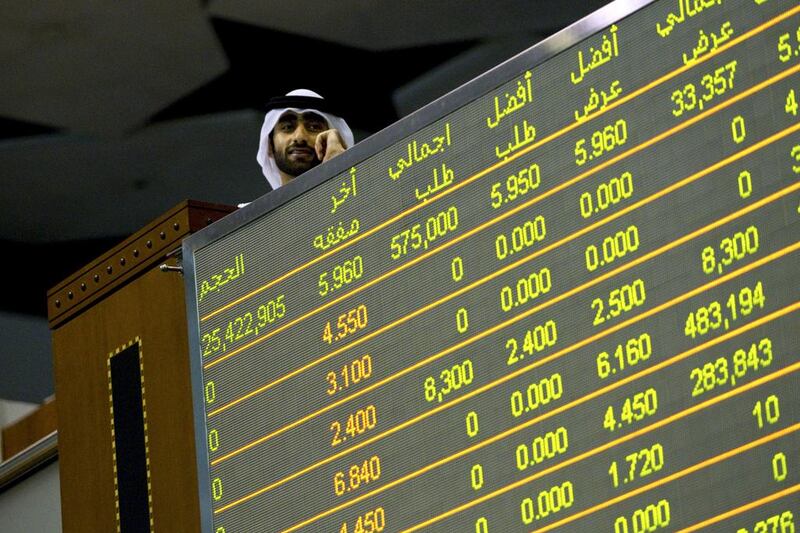Dubai ended the year ranked as the second best performing equity benchmark globally after Venezuela, with Abu Dhabi’s index coming in third.
Dubai’s stock market capitalisation almost doubled this year amid reignited investor interest in local shares in anticipation of an upgrade in its classification to “emerging markets” status and Dubai winning its bid to host the Expo 2020.
Dubai’s index achieved a 107.6 per cent return for its investors on the year, while Abu Dhabi’s gain was 63 per cent.
“It was an interesting year,” said Marwan Shurrab, the fund manager and head of trading at Vision Investments & Holdings in Dubai. “The expectation from the start was positive based on a recovery for corporates, and valuations appeared cheap. Then we had the first catalyst, the MSCI upgrade, followed by the Expo announcement, which cemented the positive sentiment taking the markets to levels not seen since 2008.”
Venezuela’s index had risen by 296.2 per cent going into the year’s final day of trading. Barring an epic last-day meltdown yesterday, that would make the Bolsa de Valores de Caracas index the world leader for the year, as measured in US dollars.
After a slow first few months, the Bolsa began its rocket ride when the March 5 death of the president Hugo Chávez raised hopes that his successor, Nicolas Maduro, would liberalise the economy.
“The country has a lot of oil, they had a dictator who passed away and investors were hoping that the new regime would engage in business deals with the oil they have and liberalise the economy,” said Fathi Ben Grira, the chief executive of Menacorp, an investment company in Abu Dhabi.
The value of total outstanding shares listed on the Dubai Financial Market has almost doubled, rising 99.8 per cent to Dh94.6 billion at year’s end from Dh47.3bn last January.
Over the same span, the market capitalisation of the Abu Dhabi Securities Exchange has risen to Dh200.1bn from Dh123.2bn, a gain of 62.3 per cent.
Investors had much to celebrate during the year.
In June, the international index compiler MSCI, which tracks US$7.3 trillion in equities around the world, classified the UAE as an emerging market, an upgrade from its previous designation as a frontier market.
And in November, Dubai, which had been hit hard by a housing crash and debt crisis five years ago, won the bidding to host World Expo 2020.
From January to November, foreign institutional investors bought $718.9m worth of UAE shares. That figure was up from $202.9m in the same period last year.
“It has been a phenomenal year, a number of key things happening – resurgence in confidence, property prices up – all good things,” said Saleem Khokhar, the head of equities at National Bank of Abu Dhabi. “And with the Expo, we’re in a situation where it really sets us up nicely for the next year. The market started from being undervalued on a fundamental basis to reasonably valued.”
UAE shares began the year trading at between eight and nine times earnings, rising to about 12 to 13 times earnings, Mr Khokhar said.
“Compared to the Global MSCI, we are still at a 30 per cent discount,” he added.
Rashed Al Baloushi, the chief executive of the Abu Dhabi Securities Exchange, said in December that he expected a stream of initial public offerings amid a recovery in asset prices and values of local shares.
Investors are awaiting fourth-quarter results, when companies close out their financial year and announce dividend payment suggestions.
“The results are expected to outperform the third quarter, which is typically the slowest season of the year,” Mr Shurrab said. “Taking that into consideration, earnings are expected to end the year strong, which provides us positive expectations on payout ratios at least to remain on the same levels as last year – between 6 to 8 per cent.”
Brokerages, meanwhile, posted a second consecutive quarter of profitability for the period ended September 31, reversing a string of losses since the global financial crisis. Net income for the third quarter reached Dh79.3 million for the 47 companies that trade on either the Abu Dhabi Securities Exchange or the Dubai Financial Market.
That is higher than the profit recorded in the previous quarter of Dh64.3m. Losses reached Dh48.1m in the third quarter of last year.
“Trading volumes were great compared to the past few years,” said Nabil Al Rantisi, the managing director of brokerage at Menacorp, an investment company based in Abu Dhabi. “I think it was a mix of two things, some clients funded their accounts more and at the same time we witnessed new account openings as well.”
From 2009 to 2011, the emirate’s index lost more than 80 per cent of its value.
Traded value on the UAE markets also dropped from Dh537bn in 2005 to a trough of Dh57bn.
Investment banks, whose key businesses include equity research and brokerage services, were forced to rethink their business presence, leading to retrenchments and the closure of their loss-making divisions.
There are today 47 equity brokerages operating in the UAE, down from 103 in 2010, according to the website of the financial regulator.
halsayegh@thenational.ae





